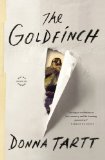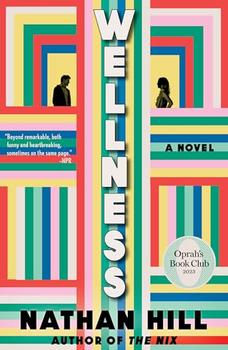Summary | Excerpt | Reviews | Beyond the book | Read-Alikes | Genres & Themes | Author Bio

A Novel
by Donna TarttWinner of the 2014 Pulitzer Prize for Fiction
Her canvas is vast. To frame a story about art, love and morality, Donna Tartt visits two continents and travels across time in a beautifully told (if sometimes sagging) story. The Goldfinch is Theo Decker's bildungsroman - a coming-of-age story painted in bold and powerful strokes.
Narrated in the first person by a now 26-year old Theo, he unfolds his life's story after the sudden death of his mother when he was just thirteen. Abandoned by his alcoholic father, the teenager must find shelter and solace where he can. These needs take him from New York City across the country to Las Vegas where he makes the one friend who will stick by him till the very end, a Ukrainian classmate named Boris. Eventually Theo returns to New York and takes up an apprenticeship under the guidance of an antiques furniture restorer named James Hobart. Looming large through these disparate threads is "The Goldfinch" - a haunting seventeenth-century masterpiece by the famous Dutch painter, Fabritius (see Beyond the Book). Theo comes to possess this piece of art, and it becomes the driver, and the unifier, that moves him through the everyday humdrum of his life. Sadly, it also becomes the cause of his undoing as he gets sucked into the shady world of art crime. At one point in the story, Theo looks at the goldfinch and reflects, "Only occasionally did I notice the chain on the finch's ankle, or think what a cruel life for a little living creature - fluttering briefly, forced always to land in the same hopeless place." The goldfinch, we realize, could well be a metaphor for Theo himself, a spirited soul meant to fly, but constrained by time and circumstance to always land in the "same hopeless place."
Donna Tartt, the author of two hugely popular books, especially her spectacular debut, The Secret History, is in fine form here. The Dickensian plot has whiffs of Catcher in the Rye and even Harry Potter ("Hobie," the mentor, reads like Rowling's Dumbledore and Boris even refers to the bespectacled Theo as "Potter"). Some of Tartt's beautifully crafted sentences are worth reading over and over again. In one brilliant smackdown, she manages to distill life's essence down to just a few breathtaking sentences:
Most people seemed satisfied with the thin decorative glaze and the artful stage lighting that, sometimes, made the bedrock atrocity of the human predicament look somewhat more mysterious or less abhorrent. It was rotten top to bottom. Putting in your time at the office; dutifully spawning your two point five; smiling politely at your retirement party; then chewing on your bedsheet and choking on your canned peaches at the nursing home.
Did I like this book? Yes, a fair amount. But I didn't love it as much as the superbly paced and breathtaking The Secret History (for the record, I liked The Little Friend too but The Secret History remains my favorite). The Goldfinch is big and sprawling but it's also messy. The middle portions set in Las Vegas, where Theo and Boris move from one drunken episode to the next, could have used some heavy editing. Frankly I am not sure I would have continued on had The Goldfinch not been a Donna Tartt book, knowing she'd spring a sudden surprise on me toward the end. And boy, does she! A dramatic event happens about two-thirds of the way in that upends the very foundations that the story is built on. It upsets not just Theo, but the reader too, because Tartt has a way of enveloping us completely in her beautifully imagined world. That this plot turn hinges on a slightly far-fetched coincidence, we shall choose to ignore. Towards the very end, Tartt throws out some rapid-fire life lessons and philosophies but it almost reads as if she realizes the story is wrapping up and she now suddenly needs to cram in some pithy material to give the story more heft. As I write this, I realize I had impossibly high expectations for the author. The one problem with being Donna Tartt is that you have to measure up to, well, Donna Tartt.
This author knows how to navigate morality's slippery slope. She did so to spectacular effect in The Secret History and there are brief flashes of that brilliance here as well. "There's no sharp line between bad and good," Boris reminds Theo, "that line is often false." Tartt makes her characters dance on a high wire walking this thin divide, sometimes falling, always coming up for air. Arguably her biggest strength lies in the portrayal of her characters, deeply flawed individuals with their moral frailties, yet vulnerable and human enough to have you care about their final outcomes.
Above all, The Goldfinch is a vibrant testament to the enduring nature of art and its ability to move your soul. The point of a beautiful thing, Tartt rightly points out, is that it connects us to a larger beauty: "It's not about outward appearances but inward significance. A grandeur in the world, but not of the world, a grandeur that the world doesn't understand."
"A really great painting is fluid enough to work its way in to the mind and heart through all kinds of different angles, in ways that are unique and very particular," Tartt reminds us in The Goldfinch. The same can be said for her impressive body of work. Her books have an ability to work their way in to your mind. In that sense, The Goldfinch, too, often meets the parameters of great art: it can reach out across time and talk to only you. Each reader will find in Tartt's latest novel (flaws and all), something "unique, very particular" - and truly her own.
![]() This review was originally published in The BookBrowse Review in November 2013, and has been updated for the
April 2015 edition.
Click here to go to this issue.
This review was originally published in The BookBrowse Review in November 2013, and has been updated for the
April 2015 edition.
Click here to go to this issue.

If you liked The Goldfinch, try these:

by K. Ancrum
Published 2025
Perfect for fans of Adam Silvera and Aristotle and Dante Discover the Secrets of the Universe, this suspenseful queer YA romance from critically acclaimed author K. Ancrum reimagines the tale of Icarus as a star-crossed love story between a young art thief and the son of the man he's been stealing from—think Portrait of a Thief for YA readers...

by Nathan Hill
Published 2024
The New York Times best-selling author of The Nix is back with a poignant and witty novel about marriage, the often baffling pursuit of health and happiness, and the stories that bind us together. From the gritty '90s Chicago art scene to a suburbia of detox diets and home-renovation hysteria, Wellness reimagines the love story with a healthy dose ...
Your guide toexceptional books
BookBrowse seeks out and recommends the best in contemporary fiction and nonfiction—books that not only engage and entertain but also deepen our understanding of ourselves and the world around us.